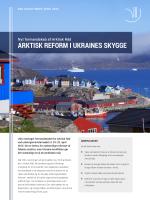Arctic Council Ministerial in the Shadow of the Ukraine Crisis
The Ukraine crisis will be on everyone’s lips when the Arctic Ministers of Foreign Affairs meet next week in Nunavut, Canada for the biennial Arctic Council ministerial. The meeting also marks that the United States take over the chairmanship of the Council from Canada. The ministerials normally focus on low-politics challenges, such as search and rescue, environmental protection, or indigenous affairs, but this year the Ukraine crisis looms in the background.
Jon Rahbek-Clemmensen, assistant professor at the University of Southern Denmark, analyzes the challenges facing the American chairmanship in a new DIIS Brief. The Arctic Council has until now been characterized by extensive collaboration, where the member states, including Russia, have gone out of their way to ensure that the good working relations would continue. However, the Ukraine crisis means that the states are more careful to guard their own national interests. Russia is dissatisfied with the Western sanctions and it is possible that Moscow will use the ministerial to demonstrate that dissatisfaction. EU permanent observer status of the Council is likely to be off the table.
The uneasy environment will likely affect the ability of the High North states to reform the Arctic Council. Its current organizational structure, with powerful rotating two-year chairmanships, leads to discontinuity in the Council’s work, as each chairmanship country comes with its own agenda. One way to diminish this challenge would be to strengthen the permanent secretariat. The American chairmanship has signaled that it wants to tackle some of these challenges. However laudable these ambitions may be, one has to be a bit skeptical about the prospects of any major accomplishments, given the current geopolitical environment, likely resistance from other High North countries, and the traditional lack of Arctic engagement from Washington.
Rahbek-Clemmensen presents four recommendations for the Arctic states:
- The Arctic states should be aware of the challenges that follow from the Ukraine crisis
- The Arctic states should see regional collaboration as a way of isolating the region from conflict spill-over from the crisis.
- The Arctic states should reform the Arctic Council to ensure continuity in the Council’s work. One way to go about going this would be to strengthen the Arctic Council’s permanent secretariat.
- The Arctic states should work to ensure that non-Arctic states, like China, Japan, Germany, and Great Britain, get real influence, either formally or informally, over decisions made in the Council.
The Policy Brief for download on the right is in Danish. Please contact Jon Rahbek-Clemmensen at jrc@sam.sdu.dk or Mikkel Runge, DIIS at mro@dis.dk for further information.
DIIS Experts



